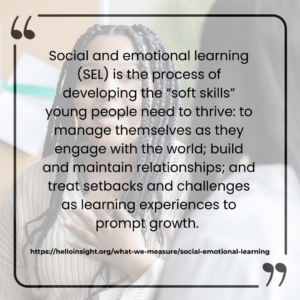In today’s rapidly changing world, the emotional and social well-being of children has gained unprecedented attention. For elementary and middle school-aged youth, the importance of social-emotional learning (SEL) cannot be overstated. It serves as a foundational element that supports not only academic success but also mental health, resilience, and interpersonal skills. As communities face an increase in stressors—whether related to family dynamics, social media influences, or academic pressures—SEL has emerged as a critical strategy in prevention and early intervention efforts.
Why Social-Emotional Learning Matters
Social-emotional learning refers to the process by which children and adults acquire the skills to understand and manage their emotions, set and achieve positive goals, feel and show empathy for others, establish and maintain positive relationships, and make responsible decisions. Here are several key reasons why SEL is essential for our youth:
 Foundation for Academic Success:
Foundation for Academic Success:
Research indicates that students who engage in SEL programs tend to perform better academically. When children are taught to identify and manage their emotions, they are better equipped to focus on learning and critical thinking.
Mental Health Prevention:
Early intervention through SEL can help identify and address social and emotional challenges before they escalate into more significant mental health issues. Teaching coping strategies and emotional regulation can decrease anxiety, depression, and behavioral problems.
Enhanced Interpersonal Skills:
SEL fosters the development of crucial social skills, such as communication, teamwork, and conflict resolution. These skills are indispensable for forming healthy relationships and building a supportive community.
Resilience Building:
In an era where young people face various adversities, including bullying and social media pressures, SEL empowers children to develop resilience. By equipping them with the tools to navigate challenges and setbacks, we help nurture a generation capable of thriving in adversity.
Cultivating Empathy and Social Awareness:
SEL programs teach children to recognize and respect diverse perspectives. This fosters an inclusive environment where all students feel valued, reducing rates of bullying and promoting mental wellness.
Palomar Family Counseling Service: A Leader in SEL Initiatives
In Oceanside and Vista, Palomar Family Counseling Service (PFCS) stands out as a leading provider of social-emotional learning in schools. Our commitment to fostering mental health and emotional well-being among youth has made a substantial impact on local communities. Here’s why we are considered a leader in this field:
 Comprehensive Programs:
Comprehensive Programs:
Palomar Family Counseling Service offers tailored SEL programs designed to meet the unique needs of elementary and middle school students. Their curriculum aligns with best practices and is backed by research, ensuring its efficacy in building emotional and social competencies.
Collaborative Partnerships:
Working closely with local schools, educators, and parents, PFCS fosters a collaborative approach to SEL, ensuring that learning extends beyond the classroom. This collective effort helps create a supportive environment where students can thrive.
Trained Professionals:
PFCS employs trained mental health professionals who are not only skilled in counseling but also adept at integrating SEL into everyday interactions with students. Their expertise plays a pivotal role in creating a safe and nurturing atmosphere conducive to emotional growth.
Focus on Prevention:
By prioritizing prevention and early intervention, PFCS aims to address potential issues before they develop into severe mental health problems. Their proactive strategies emphasize equipping youth with the skills necessary to navigate life’s challenges.
Community Engagement:
PFCS actively engages with the community outreach to families and the school community, raising awareness about the importance of social-emotional learning and mental health. This commitment to community education helps reduce stigma and encourages open dialogue about mental health issues.
Conclusion
As we navigate the complexities of modern life, prioritizing social-emotional learning as a critical component of prevention and early intervention in youth is more important than ever. Organizations like Palomar Family Counseling Service play an essential role in equipping our younger generations with the tools they need to succeed emotionally, socially, and academically. By investing in SEL, we are investing in the future well-being of our children and communities. Let’s commit to fostering a healthier, more resilient generation—because every child deserves the opportunity to thrive.
To learn more about social-emotional learning and our prevention & early intervention programs, contact:
Chris DuVall, LMFT, cduvall@pfcs.agency
Ashley White, LMFT, awhite@pfcs.agency

